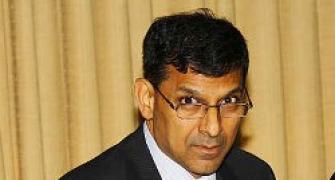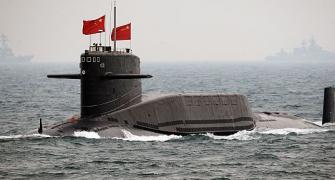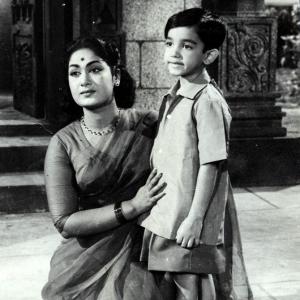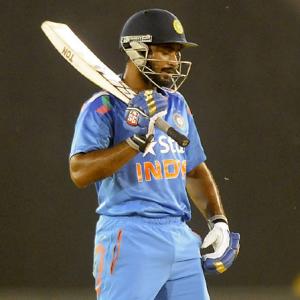
‘Much like Indira, Modi’s strength can also be his weakness’
‘There is both substance and hype in Modi’
‘Modi’s challenge is to rise above the hype’
In the final part of his interview with Sheela Bhatt/Rediff.com, journalist Rajdeep Sardesai says the Congress lost the election in 2011, the year of Anna Hazare.
Don’t miss:
Part 1: 'I have never been anti-Modi'
Part 2: 'Item number was wrong for Priyanka, I should have said cameo'
In the last chapter you have written about the functioning of the Modi sarkar.
My last chapter will have to be constantly rewritten based on Modi. But I think at the moment he is running the government by running a strong Prime Minister's Office and relying on a very few people. I think this is both his strength and weakness.
Modi’s strength is that he now has the ability to talk directly to people and bypass structures, including party structures.
That is the Gujarat model.
Yes. He is bringing a lot of elements of the Gujarat model to Delhi and he is using that here very successfully.
In Gujarat he relied on very few people and here also he relies on very few people.
Modi’s challenge and what he has not been able to demonstrate successfully is, how is he going to work with people in Delhi. How will he work with contrary opinions and the people he needs to carry with him, if he has to succeed.
Modi has to show his strategy for Centre-state relations. Modi can impose the Gujarat model on his PMO. But can he do so on Parliament? Can he impose it on, let’s say, dealing with the GST? Where he has to convince a Mamata Banerjee or a J Jayalalithaa? Or Naveen Patnaik, that GST is good for you.
Modi’s strength could also be his weakness. Much like Indira. I see a lot of similarities between Modi and Indira Gandhi.
What kind of threats do you see in the imposing of the Gujarat model on New Delhi?
I think one of the threats is, how is Modi able to recognise that running India is not the same as running Gujarat, the Gujarat model with all its strengths also has weaknesses.
As PM you also have to be a harmoniser. You have to harmonise within and outside. You need to harmonise your team. You can’t run your team only through fear. Similarly, you can’t build relations only through confrontations.
I think the challenge for Modi is, can he do a Gujarat model plus for Delhi. Along with the Gujarat model, also look for new ways to govern. How will you build confidence in your own Cabinet?
Which are the personal qualities of Modi, the man you saw in 99-98, that have brought him here?
I think he is remarkably focused. Others had distractions. Pramod Mahajan had his own distractions, and Govindacharya was so caught up in ideologies. Modi is not even an ideologue.
See, luck is also there, 2001 was the year of earthquake in Gujarat, else Keshubhai Patel would not have been under the pressure he was, maybe Delhi would not have replaced Keshubhai with Modi.
So luck always plays a role in politics.
Is Modi more hype or more substance?
There is no doubt hype is there because Modi is such a new phenomenon and is an outsider who has come in. So naturally there is hype. And then he is a terrific communicator so he is able to dominate the narrative or discourse so there is hype.
But to say there is no substance will also be unfair. Let’s be clear, Modi has run Gujarat for 12 years. The glass is half full and half empty. Jyotigram is such a success story. I have spoken to a few Gujarat bureaucrats and they say Modi has out of the box ideas. So there is both substance and hype.
But Modi should not become a victim of his own hype. Modi should realise, and he is clever enough to realise, that hype alone will not make him PM for 10 years. He will have to do a few things with substance also. So Swachch Bharat cannot just become a photo op. Modi’s challenge is to rise above the hype.
I personally, grudgingly, will admit that Modi is far cleverer than what I thought nine-10 years ago. I remember Modi from the 1990s, at that time I thought Pramod Mahajan was the cleverest of them all. If I was asked in 1998 and we did a poll on who would be the future leader, I thought Mahajan would be the future leader of the BJP. Because he was very strategic at that time and Narendrabhai was very low profile.
Even if you wanted to understand what was happening, you turned to Govindacharya, not to Modi.
Will Modi deliver?
I would say that I sense Modi is here to stay for 10 years. Because he has understood what it takes to win elections. But after that the jury is out. I am at the moment only willing to say that he has 10 years to deliver. But whether he will deliver in those 10 years, I think that is a question mark.
He says, on corruption, I will neither take bribes nor allow you to take bribes. Are you still going to be able to manage without paying hafta to some police-wallah or income tax person? How is Modi going to achieve that?
I have said in my epilogue that I’m not convinced Modi is an instinctive reformer. Modi is not a natural reformer, he is into “reform himself”. ‘I’m the reform’. He is not trying to reform institutions.
I think he has an opportunity because this kind of mandate gives you opportunity. But whether he will deliver or not, I’m not so sure.
Do you think Amit Shah and Modi are on the same page on the management of the party and the government?
I think they are on the same page. I think Amit Shah is around 14 years younger to Modi. Shah is 50 and Modi is 64. And I think Amit Shah realises that he is very much the junior partner. Indians like jodis and this is Jodi Number 1 in which Amit Shah has a role to play and Modi has a role to play.
Amit Shah will be seen as the person who has to drive the party’s election strategy in state after state. He is the person who has to ensure that the cadres and organisations are enthused about ideology, that the organisation doesn’t become de-ideologised. Modi will play the statesman, the governance guru.
Modi and Amit Shah have their roles cut out. Ten years from now, Modi will be 74 and Amit will be 60, then we will have to see what role they want to play for each other. At the moment they are playing their roles and there is no moment of tension.
The issue of dynastic politics is quite under discussion and you have understood the Congress as well as the BJP. In the book you have written how the Congress failed to pick up its guns to fight these elections with a robust strategy. What is the way out for the Congress?
This book is as much about the Congress’s failure as about the BJP’s success. This question is more difficult than, can Modi deliver? Because I feel the Congress cannot survive right now without the dynasty. It is part of their system.
What the Congress or Rahul Gandhi can do is to become an intelligent family company and appoint very strong CEOs. To appoint very strong CEOs in Rajasthan, Madhya Pradesh, Uttar Pradesh, Maharashtra -- states where the Congress need to recover if it wants to have any hope.
But if you continue to remain chairman of the company, concentrate power in yourself and are unable to find strong CEOs, then the Congress has a death wish. So the Congress will have to go back to the pre-1967 era. Before Indira, when Congress had strong state chiefs. Is the Congress willing to do that?
The Congress saw a glimpse of that with Sachin Pilot in Rajasthan. Tell Sachin Pilot you have to stay in Jaipur for the next five years and you have to drive the party there.
Tell Jyotiraditya Scindia please don’t stay in Delhi, for five years I only want to see you in Bhopal.
Tell Priyanka Gandhi, I want you to be in Uttar Pradesh, for five years you stay in Lucknow.
Or you yourself go there and stay for five years in Lucknow.
That, according to me, is the only hope for this party. It cannot be run from Delhi. Dynasty might be there. That is the Congress’s prerogative.
How much blame should go to Sonia Gandhi for the Congress’s failure in 2014 and for Modi’s success?
Sheela, I write in my book that I think the Congress lost this election in 2011. That was the horrible year for the Congress -- the year of Anna (Hazare).
In my view that was the year the Congress should have seen the writing on the wall, in my view that was the year Manmohan Singh should have stepped down, because I think that time he had lost interest and become tired, he was not well.
That was the year the Congress should have effected change. The only person who could have effected the change was Sonia Gandhi.
Sonia Gandhi failed in 2011 because she is a status quoist. Had she rocked the boat in 2011, there could have been some challenge to Modi in 2014.
How can the Congress redefine itself?
I said the Congress has to redefine itself by decentralising itself.
What about the issue of secularism?
I think the Congress has boxed itself into a corner where secularism for them is Muslim politics. That cannot be the future. Where the only community you are targeting are the Muslims.
The only group that voted more for the Congress than the BJP is the Muslims. Dalits didn’t vote for you, tribals didn’t, and you claim you are a pro-poor party. But the poorest of the people did not vote for you.
So the Congress has to go back to redefining itself not in terms of secularism vs communalism, but it has to go back to define itself as a mass-based party. The problem is the Congress has become a drawing room party.
Do you think the coalition era is ending and the regional parties will be wiped out?
I think regional parties in the form that they are running in are in big trouble. I like what Shivanand Tiwari said in an Indian Express article. This Tughlaqi style leadership of regional parties, which is whimsical, arbitrary, and family-oriented, dynastical, that is coming to an end. You also need to provide governance.
You can’t run a regional party as your own personal freedom. And that is a challenge to all political parties.
Why did you write this book? Are you in search of some identity which is different from what your identity was in television?
I have always seen myself as a print journalist. I started off as a print journalist and I have always been excited by the idea of writing. I still get a great high by writing a column and reading the byline. I think it feels much better than doing a television programme.
My initial idea was to write a book on the media. From media I shifted to Modi after I spent a lot of time on the 2014 campaign in my election trackers, reading material, talking to people. I made notes and very rigorously right through the trackers I would note down all the data.
I was trying to understand this Modi phenomenon and I feel I was at an advantage because I had seen this for the last 20-25 years. So I was just trying to complete one chapter of my life.
I met Modi in 1990 and it’s now 2014, so for the past 24 years Modi has been sometimes in my periphery and sometimes in my proximity as a journalist. And I feel maybe there was a book waiting to be written and I was very keen to write so it just happened.
I remember telling Chiki Sarkar of Penguin that I will write it if Modi gets a majority.
What has happened is a truly remarkable landmark election. Someone suggested to me to write the biography of Modi. I said I don’t know Modi well enough, plus Modi is a work in progress. And there are many of his biographies.
Elections are something that have always interested me. I always wonder, what is it that makes one vote for a particular party? What is it that makes one small vendor vote for someone? I think as a journalist it is great to study the voter’s behaviour.
So this book is not about Modi, he is just a central character. This book is about elections and what made India vote the way it did.
Don't miss: Bharat Ratna CNR Rao: 'I expect great things for science under Modi'
Image: Narendra Modi. Photograph: Subhav Shukla/PTI Photo.
Buy Rajdeep Sardesai's book 2014: The Election That Changed India










